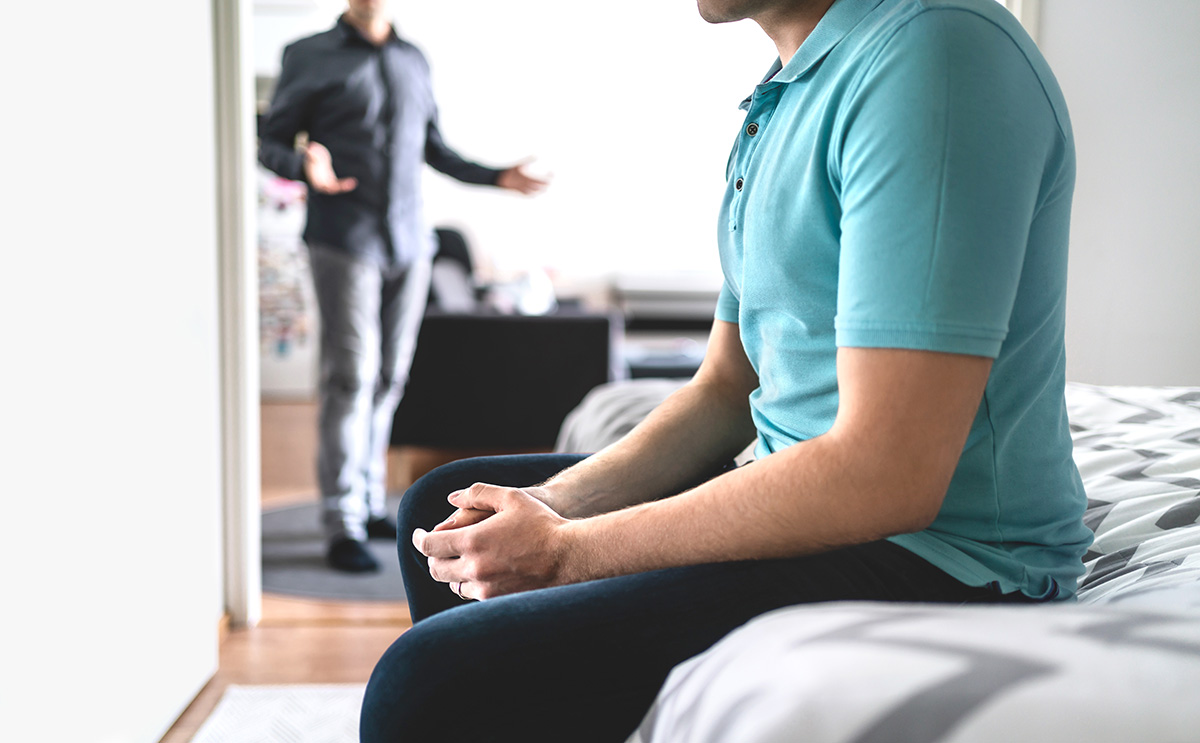Advice
Lesbian wife suddenly wants to become a mom no matter what
Couple reaches stalemate over whether or not to start a family


Couple reaches stalemate over whether or not to start a family.
Michael,
My wife has decided we have to have a baby but I have no interest in becoming a mom.
She never brought this up as something she wanted for the two years we were dating. In fact, we often poked fun at the new expectation that gay couples should be just like straight couples, settling down to have children after the wedding.
But we got married a year ago and here we are in this predicament. Ashley turned 38 last month and her younger sister just had a baby who is the first grandchild in the family. Ashley says that seeing her sister bond with our new niece has made her realize that she wants to be a mother.
Because she’s afraid she’s getting too old to get pregnant, Ashley is pushing me to get on board so that she can start trying right away. But there’s no way I want to do this.
I’m not interested in putting in the time to raise a child. I’ve never particularly liked children and I don’t even like spending time with our new niece, who mainly wails.
I’m also far more interested in using my free time and extra cash for leisure than for monitoring playdates and paying tuition.
Ashley says I’m being selfish, not thinking how important this is to her. By that logic, isn’t she being selfish by not thinking how important it is for me not to have a child?
She also says that it’s important to “give back” to the world by raising a child. But I give a lot of money to charities that help animals and the environment. I think there are too many humans already and we’re making a mess of this planet. It seems crazy to go out of our way to create more.
Very seriously, I also wonder what any child’s life will be like when they grow up, given the increasingly dire predictions about global warming. Why bring someone into this world that is likely going to be a scary and difficult place to live?
But above all, I just don’t want to put in the time and resources necessary to properly raise a child. Yet Ashley is determined to do this and I can’t reason her out of this. We’re at a stalemate. Any pointers for how we can figure this out?
Michael replies:
You’re finding out how challenging marriage can be.
We think we know the person we marry, we think we’re on the same page regarding all the important stuff, and then, wham! The other person keeps changing. And so do we.
That’s marriage.
If you’re determined not to have a child and it’s more important for you to be childless than to be with Ashley, and if Ashley would rather have a child than be childless with you, then the two of you have three choices: You can end your marriage right now, you can stay together and feel resentful and miserable about your lot in life going forward or you can challenge yourself to wholeheartedly change the vision you have for your life.
So, before considering deal breakers and end games, talk with each other about why what you want is important to you. And listen to your spouse’s answer with an open mind. The winner/loser dynamic is a surefire way to destroy goodwill in a relationship, so stop trying to talk your spouse out of her opinion.
Instead, strive to be curious, to learn why your partner has this dream for her life. One of you might decide that because you love your wife and do not want to lose the relationship, you are willing to support her dream, even if your life won’t play out the way you’d hoped.
This is not about compromise. Supporting your partner’s dream means being all in.
One important aspect of marriage is dealing with our differences. If you can manage this without losing yourself or losing the other, you’re likely to have a vital, resilience-building journey through life.
That said, if you remain married there is no way for Ashley to be a mother and for you not to be a mother. If you do agree to become a parent, you will have to be a loving parent and give your child your best. It would be an injustice to the child not to do so.
Even with a small child, it is possible to have some life of your own and some leisure time. If you speak with parents whom you know with children of varying ages, you might learn that the picture is not as bleak as you imagine. Kids don’t remain wailing infants forever, but at first they can be all-consuming.
I understand your concern about bringing children into this world. At present, things do seem awfully bleak for humankind going forward. Though there are no guarantees, perhaps you would raise a thoughtful child who might make a positive difference toward a better future for our planet.
Michael Radkowsky, Psy.D. is a licensed psychologist who works with LGBT couples and individuals in D.C. He can be found online at michaelradkowsky.com. All identifying information has been changed for reasons of confidentiality. Have a question? Send it to [email protected].
Advice
Should I divorce my husband for the hot new guy in our building?
Debating whether to leave or stay after the sex goes cold

Dear Michael,
I’ve been with my husband for 10 years and the sex is pretty much gone. It stopped being exciting a long time ago and pretty much the only time we ever do it is with the occasional third.
A really hot guy moved into our building about a year ago. We would see each other sometimes in the elevator or at our building’s gym and we started talking and really hit it off. Mark is 15 years younger than I but we seem to have a lot in common. We started hooking up and the sex is amazing.
I haven’t told my husband because it’s breaking our rule about no repeats. I have to say that the secrecy is hot. It’s kind of a thrill to take the elevator upstairs when I say I’m going on an errand. But it’s more than that. I have a connection with Mark that is far more amazing than what I have ever felt with my husband. Not just the sex. We just enjoy being together, talking about anything and everything.
My husband went to visit his family last weekend and I spent the whole time with Mark. Since then I can’t stop thinking that I want to leave my husband and be with Mark.
Part of me thinks this is a crazy mid-life crisis. I mean, this kid’s in a totally different place in life. But we have mind-blowing sex and a fantastic connection. I’d like your thoughts on how to proceed.
Michael replies:
You’ve got a lot to consider.
First: Sex with a long-term partner changes over time. It tends to be less about erotic heat and more about the connection with a person whom you love. In other words, it’s being with the person you’re with that makes the sex meaningful and even great. Having a good sexual relationship with a long-term partner comes far more from a heart connection than from a crotch attachment.
Second: You seem ready to throw your relationship under the bus pretty quickly, without addressing other problems in the relationship besides sex. When you are sneaking around, lying, and rule-breaking , I don’t see how you can look your husband in the eye; and if you can’t look him in the eye, you certainly can’t have even a half-way decent relationship.
Yet another point to consider: Affairs pretty much always seem more exciting than marriage. The partner is new, which almost automatically makes the sex hotter; the secrecy is a thrill; and you don’t have to deal with paying the rent, house chores, and all the petty annoyances of living up-close with someone day-in, day-out.
You are bringing lots of energy to your affair, and everything about it is exciting. You are bringing no energy — at least no positive energy — to your marriage. You get what you put into a relationship.
Divorce is not something that should be entered into lightly. Be aware that if you leave your husband for Mark, you will no doubt find over time that the sex becomes less exciting and that the connection is not always fantastic. No surprise, 75 percent of marriages that begin with affair partners end in divorce. While I don’t think statistics predict what will happen to any particular couple, believing that you will have a significantly better relationship with your affair partner than you did with your husband sets you up for likely disappointment.
Many gay men focus on “hot sex” as the big draw, pursuing a lot of sex with a lot of men, and/or pursuing an ongoing series of relationships that last until the sex cools. If that’s what you want, that’s fine. But it’s a different path from pursuing a close and loving long-term relationship, which involves knowing someone well and having him know you well; collaborating on getting through the hard stuff life throws at us; finding ways to make peace with disappointment; and consistently striving to be someone worth being married to.
How to proceed? While you are the only person who should make that decision, I would suggest that whatever your choice, keep in mind that marriage can be more than what you’ve made of it, so far.
Michael Radkowsky, Psy.D. is a licensed psychologist who works with couples and individuals in D.C. He can be found online at michaelradkowsky.com. All identifying information has been changed for reasons of confidentiality. Have a question? Send it to [email protected].
Advice
Giving up drinking is killing our relationship
What happens when one partner is sober and the other isn’t

I’m a 38-year-old guy, was single for most of my 30s, which I didn’t like at all, and I finally met a great guy last Memorial Day Weekend.
Until New Year’s I would have said that everything was going great. I was on Cloud Nine. Eric is kind, handsome, smart, and a great catch.
But in December he decided to do “Dry January.” It was kind of on a whim I think. We were out with some friends and one of them said he was not going to drink at all for the month of January. He thought alcohol was playing too big a role in his life so he wanted to see what life would be like without it. Another friend said he would do it too, and then Eric said he would.
I wish we hadn’t gone out that night and then this whole thing wouldn’t have happened.
So, as the month progressed, Eric started talking more and more about how much better he was feeling without alcohol in his body or his life.
I don’t think we drank that much pre-January. Yes, we’d have something to drink every time we went out, with friends or just together, but not to excess.
At some point, Eric started saying that he wasn’t really enjoying going out with our friends, as he wasn’t drinking and they were (except the two friends who were also doing the Dry January thing). This meant I’d either go out without him (which I didn’t like) or we’d stay home, or go out just the two of us. But then if I’m drinking and he’s not, it just feels awkward. He hasn’t said anything but I feel like he’s judging me whenever I have a drink.
I was hoping he’d relax about the whole thing at the end of the month but now he’s decided he doesn’t want to drink anymore at all.
To make matters worse, he says that the month made him think more about the big role alcohol plays in his life (his words) and he has started going to Alcoholics Anonymous meetings.
So where does this leave me? I do want to keep drinking. I’m just a social drinker and I don’t have a problem with alcohol. I think it adds a fair amount of fun to my life. Plus, all my friends drink (including the two who did Dry January) and it’s a big part of our socializing. If you don’t drink when everyone else is drinking, it’s really not fun and it feels weird.
At this point Eric doesn’t go out with the friend group we were going out with because he doesn’t have a good time as the only non-drinker. (I get it, that’s one of the reasons I drink when my friends are drinking.) So I go out sometimes without him, which as I mentioned doesn’t feel so good, and which I don’t think is great for our relationship; or I don’t go out with my friends, which I don’t like.
I love Eric and I could see us having a great life together but his not drinking has opened what feels like a chasm between us.
How do couples handle this situation, where one person wants to stop drinking and the other does not? The impact is seeming increasingly huge to me and I don’t see how to make it stop being a divisive problem.
Michael replies:
I don’t think that Eric’s sobriety needs to be a divisive problem, if you can tolerate that you don’t get to have your life with Eric be exactly as you would like.
This is the same dilemma that everyone in a serious relationship must face. Our partners are always different from us in some important ways, even if it doesn’t seem that way at first. And we have to figure out how to live with these differences, contentedly for the most part. Our partners face the same challenge.
Of course, not every difference can be (or should be) resolvable. For example, if one person is determined to parent and the other person is determined to be child-free, it makes great sense to part ways — unless one person decides they’d rather stay with their partner than have it their way.
You and Eric have to figure out if your differences around alcohol are a deal-breaker, or if you can find a way to build a solid relationship, even as you drink socially and he is sober.
Whether and how you do this are for the two of you to figure out. That said, here are some ideas for your consideration:
- Can you accept Eric’s not joining you for some or even many of your social activities?
- Can you and Eric talk about what might help him be more comfortable joining your friends now and then?
- Can you ask Eric what it’s like for him when you are drinking, rather than assuming that he is judging you? (Important question for your consideration: What led you to make that assumption rather than asking him?)
- If Eric is making friends in Alcoholics Anonymous, would you want to join him at times when he socializes with them?
The main ingredients here are generosity, flexibility, collaboration, and curiosity.
Speaking of curiosity, rather than wishing that the two of you had missed that invitation to participate in Dry January, how about being curious about Eric’s decision to stop drinking? I suspect that your dismissiveness has a negative impact on his desire to be close to or confide in you. If you are curious about this important life change that Eric is undertaking, you will certainly learn a lot about your boyfriend, and likely deepen your connection.
Michael Radkowsky, Psy.D. is a licensed psychologist who works with couples and individuals in D.C. He can be found online at michaelradkowsky.com. All identifying information has been changed for reasons of confidentiality. Have a question? Send it to [email protected].
Advice
Tips for strengthening your relationship
On Valentine’s Day, recommit to tackling challenges together

Working as a couples therapist, I’ve had many people tell me over the years how difficult they think it is to have a happy relationship. “The divorce rate is over 50%.” “It’s so much work.” “If it’s this hard, something must be wrong.”
Here’s some very good news: The high divorce rate and the number of failed relationships you see around you need have no impact on the success of your own relationship.
While building and maintaining a healthy relationship takes effort, doing so is possible, and the ongoing challenge of finding creative and loving ways to handle tough challenges can actually be fun.
In the spirit of Valentine’s Day, here are my top suggestions for steps you can take to have a great relationship.
Please keep in mind that while these steps are simple in concept, they are not always easy to practice. So don’t get discouraged. And remember that if you consistently work at doing your best in your relationship, doing so will likely get easier over time.
- Strive to always have a sense of humor about how difficult relationships can be. We’re all different in big ways, so of course it’s hard to share your life with someone at times. If you can keep this in mind instead of thinking “this should be easy,” you will actually have a much easier time navigating the challenges of being coupled.
- Avoid wanting to be “right.” By this, I mean both trying to prove to your partner that you are right, and simply maintaining the belief in your mind that you are right. Wallowing in this belief gives you a sense of superiority, competition, and grievance, all of which are corrosive to your relationship. In addition, if there is a winner in the relationship, there is a loser, and that’s a terrible dynamic for a couple to have.
- Aim to be generous: Be open to saying “yes” to your partner’s requests whenever possible; endeavor not to keep score on who has been more generous; and make it a priority to support your partner’s happiness. And at the same time:
- Have a boundary when necessary. When you say “no,” do so from your integrity, not from scorekeeping or spite. This means understanding why something is important to your partner, while at the same time being clear that something different is even more important to you that requires saying “no” to your partner’s request.
- Accept that disappointment is inevitable in every relationship. Because we are all different, we will at times see, understand, think, prioritize, and behave in ways that are very different from our partners, including on important matters. Therefore, it’s inevitable that we will occasionally be gravely disappointed in our partners, just as they will be gravely disappointed in us. That’s life. Accepting this truth can make it easier to bear.
- Advocate for what is important to you. Two caveats, though. First, you don’t want to weigh down the relationship with too many requests. Second, be prepared to not always get what you ask for. It is not your partner’s job to meet your every want.
- Don’t wait for your partner to make the first move when you want something to happen. If both of you are waiting for the other person to go first, nothing will happen. This includes (but is absolutely not limited to) apologies, initiating sex, planning vacations, and starting hard conversations.
On a related note:
- Focus on what you can do to improve a situation, rather than on what your partner is doing, is not doing, or should be doing. We don’t have much power over the other person, but we have a lot of power over ourselves.
A special note for gay men: Open relationships appear to be practically the norm these days, but they are tricky to conduct well. (Yes, monogamy has its own challenges.) Jealousy, messy boundaries, dishonesty, and trust issues get easily activated. If you want to build a strong open relationship, be aware that doing so takes a lot of skill, a lot of honesty, a lot of acceptance, and some ways of keeping your primary relationship special.
Also keep in mind that being a gay man doesn’t automatically provide skills such as:
- The solidity of self to be trusting and generous.
- The ability to sense how far boundaries can be pushed without doing too much damage.
- The capacity to transcend feelings of jealousy and pain.
- The strength of character not to idealize outside sex partners.
Wishing you a happy Valentine’s Day!
Michael Radkowsky, Psy.D. is a licensed psychologist who works with couples and individuals in D.C. He can be found online at michaelradkowsky.com. All identifying information has been changed for reasons of confidentiality. Have a question? Send it to [email protected].
-

 State Department3 days ago
State Department3 days agoState Department releases annual human rights report
-

 Maryland5 days ago
Maryland5 days agoJoe Vogel campaign holds ‘Big Gay Canvass Kickoff’
-

 Politics4 days ago
Politics4 days agoSmithsonian staff concerned about future of LGBTQ programming amid GOP scrutiny
-

 District of Columbia1 day ago
District of Columbia1 day agoCatching up with the asexuals and aromantics of D.C.











